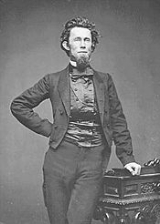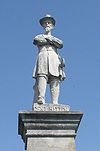
Robert H. Hatton
Encyclopedia
Robert Hopkins Hatton was a lawyer, politician, United States Congressman, and Confederate
officer during the American Civil War
.
, but, early in his life, his family moved to Tennessee
. He graduated from Cumberland University
, then studied law there at Cumberland School of Law
and established a successful practice in Lebanon, Tennessee
, after passing the bar exam in 1850. He joined the Whig Party
and was elected to the State Legislature in 1855. He unsuccessfully ran for governor in 1857. He was elected to the Thirty-sixth Congress in 1858 as an Opposition party
candidate (the Whig party had collapsed), where he served as chairman of the Committee on Expenditures in the Department of the Navy.
 Hatton believed that the Union should be preserved and initially opposed secession
Hatton believed that the Union should be preserved and initially opposed secession
. However, after President
Abraham Lincoln
called for volunteers to invade the Southern states, Hatton reversed his position and formed a Confederate military unit, the Lebanon Blues, which became a part of the 7th Tennessee. Hatton was soon elected as colonel
of the regiment, which was sent to western Virginia
in July 1861.
In 1862, Hatton and his men were ordered to the Richmond
area to stop Federal Maj. Gen. George B. McClellan
's drive on the Confederate capital. During the resulting Peninsula Campaign
, Hatton served with distinction, and on May 23, 1862, he was promoted to brigadier general of the 4th Brigade, 1st Division, Army of Northern Virginia
; this appointment was not confirmed by the Confederate Congress
. Just eight days later, he was shot in the head and killed while leading his Tennessee Brigade at the Battle of Fair Oaks
.
His body was returned to Tennessee for burial, but because Middle Tennessee was occupied by Federal troops, he was temporarily buried at Knoxville
. On March 23, 1866, he was reburied in Lebanon's Cedar Grove Cemetery. A statue of him was erected in Lebanon's town square in 1912.
is named in his memory and honor.
Confederate States Army
The Confederate States Army was the army of the Confederate States of America while the Confederacy existed during the American Civil War. On February 8, 1861, delegates from the seven Deep South states which had already declared their secession from the United States of America adopted the...
officer during the American Civil War
American Civil War
The American Civil War was a civil war fought in the United States of America. In response to the election of Abraham Lincoln as President of the United States, 11 southern slave states declared their secession from the United States and formed the Confederate States of America ; the other 25...
.
Biography
Hatton was born in Steubenville, OhioSteubenville, Ohio
Steubenville is a city located along the Ohio River in Jefferson County, Ohio on the Ohio-West Virginia border in the United States. It is the political county seat of Jefferson County. It is also a principal city of the Weirton–Steubenville, WV-OH Metropolitan Statistical Area...
, but, early in his life, his family moved to Tennessee
Tennessee
Tennessee is a U.S. state located in the Southeastern United States. It has a population of 6,346,105, making it the nation's 17th-largest state by population, and covers , making it the 36th-largest by total land area...
. He graduated from Cumberland University
Cumberland University
Cumberland University is a private university in Lebanon, Tennessee, United States. It was founded in 1842, though the current campus buildings were constructed between 1892 and 1896.-History:...
, then studied law there at Cumberland School of Law
Cumberland School of Law
Cumberland School of Law is an ABA accredited law school at Samford University in Birmingham, Alabama. The 11th oldest law school in the United States, it is 160 years old and has more than 11,000 graduates. Its alumni include two United States Supreme Court Justices; Nobel Peace Prize recipient...
and established a successful practice in Lebanon, Tennessee
Lebanon, Tennessee
Lebanon is a city in Wilson County, Tennessee, in the United States. The population was 20,235 at the 2000 census. It serves as the county seat of Wilson County. Lebanon is located in middle Tennessee, approximately 25 miles east of downtown Nashville. Local residents have also called it...
, after passing the bar exam in 1850. He joined the Whig Party
Whig Party (United States)
The Whig Party was a political party of the United States during the era of Jacksonian democracy. Considered integral to the Second Party System and operating from the early 1830s to the mid-1850s, the party was formed in opposition to the policies of President Andrew Jackson and his Democratic...
and was elected to the State Legislature in 1855. He unsuccessfully ran for governor in 1857. He was elected to the Thirty-sixth Congress in 1858 as an Opposition party
Opposition Party (United States)
The Opposition Party in the United States is a label with two different applications in Congressional history, as a majority party in Congress 1854-58, and as a Third Party in the South 1858-1860....
candidate (the Whig party had collapsed), where he served as chairman of the Committee on Expenditures in the Department of the Navy.

Secession
Secession is the act of withdrawing from an organization, union, or especially a political entity. Threats of secession also can be a strategy for achieving more limited goals.-Secession theory:...
. However, after President
President of the United States
The President of the United States of America is the head of state and head of government of the United States. The president leads the executive branch of the federal government and is the commander-in-chief of the United States Armed Forces....
Abraham Lincoln
Abraham Lincoln
Abraham Lincoln was the 16th President of the United States, serving from March 1861 until his assassination in April 1865. He successfully led his country through a great constitutional, military and moral crisis – the American Civil War – preserving the Union, while ending slavery, and...
called for volunteers to invade the Southern states, Hatton reversed his position and formed a Confederate military unit, the Lebanon Blues, which became a part of the 7th Tennessee. Hatton was soon elected as colonel
Colonel (United States)
In the United States Army, Air Force, and Marine Corps, colonel is a senior field grade military officer rank just above the rank of lieutenant colonel and just below the rank of brigadier general...
of the regiment, which was sent to western Virginia
West Virginia
West Virginia is a state in the Appalachian and Southeastern regions of the United States, bordered by Virginia to the southeast, Kentucky to the southwest, Ohio to the northwest, Pennsylvania to the northeast and Maryland to the east...
in July 1861.
In 1862, Hatton and his men were ordered to the Richmond
Richmond, Virginia
Richmond is the capital of the Commonwealth of Virginia, in the United States. It is an independent city and not part of any county. Richmond is the center of the Richmond Metropolitan Statistical Area and the Greater Richmond area...
area to stop Federal Maj. Gen. George B. McClellan
George B. McClellan
George Brinton McClellan was a major general during the American Civil War. He organized the famous Army of the Potomac and served briefly as the general-in-chief of the Union Army. Early in the war, McClellan played an important role in raising a well-trained and organized army for the Union...
's drive on the Confederate capital. During the resulting Peninsula Campaign
Peninsula Campaign
The Peninsula Campaign of the American Civil War was a major Union operation launched in southeastern Virginia from March through July 1862, the first large-scale offensive in the Eastern Theater. The operation, commanded by Maj. Gen. George B...
, Hatton served with distinction, and on May 23, 1862, he was promoted to brigadier general of the 4th Brigade, 1st Division, Army of Northern Virginia
Army of Northern Virginia
The Army of Northern Virginia was the primary military force of the Confederate States of America in the Eastern Theater of the American Civil War, as well as the primary command structure of the Department of Northern Virginia. It was most often arrayed against the Union Army of the Potomac...
; this appointment was not confirmed by the Confederate Congress
Congress of the Confederate States
The Congress of the Confederate States was the legislative body of the Confederate States of America, existing during the American Civil War between 1861 and 1865...
. Just eight days later, he was shot in the head and killed while leading his Tennessee Brigade at the Battle of Fair Oaks
Battle of Seven Pines
The Battle of Seven Pines, also known as the Battle of Fair Oaks or Fair Oaks Station, took place on May 31 and June 1, 1862, in Henrico County, Virginia, as part of the Peninsula Campaign of the American Civil War. It was the culmination of an offensive up the Virginia Peninsula by Union Maj. Gen....
.
His body was returned to Tennessee for burial, but because Middle Tennessee was occupied by Federal troops, he was temporarily buried at Knoxville
Knoxville, Tennessee
Founded in 1786, Knoxville is the third-largest city in the U.S. state of Tennessee, U.S.A., behind Memphis and Nashville, and is the county seat of Knox County. It is the largest city in East Tennessee, and the second-largest city in the Appalachia region...
. On March 23, 1866, he was reburied in Lebanon's Cedar Grove Cemetery. A statue of him was erected in Lebanon's town square in 1912.
Honors
The Robert H. Hatton Camp #723 http://hatton.scv.org of the Sons of Confederate VeteransSons of Confederate Veterans
Sons of Confederate Veterans is an American national heritage organization with members in all fifty states and in almost a dozen countries in Europe, Australia and South America...
is named in his memory and honor.
See also
- List of American Civil War generals

